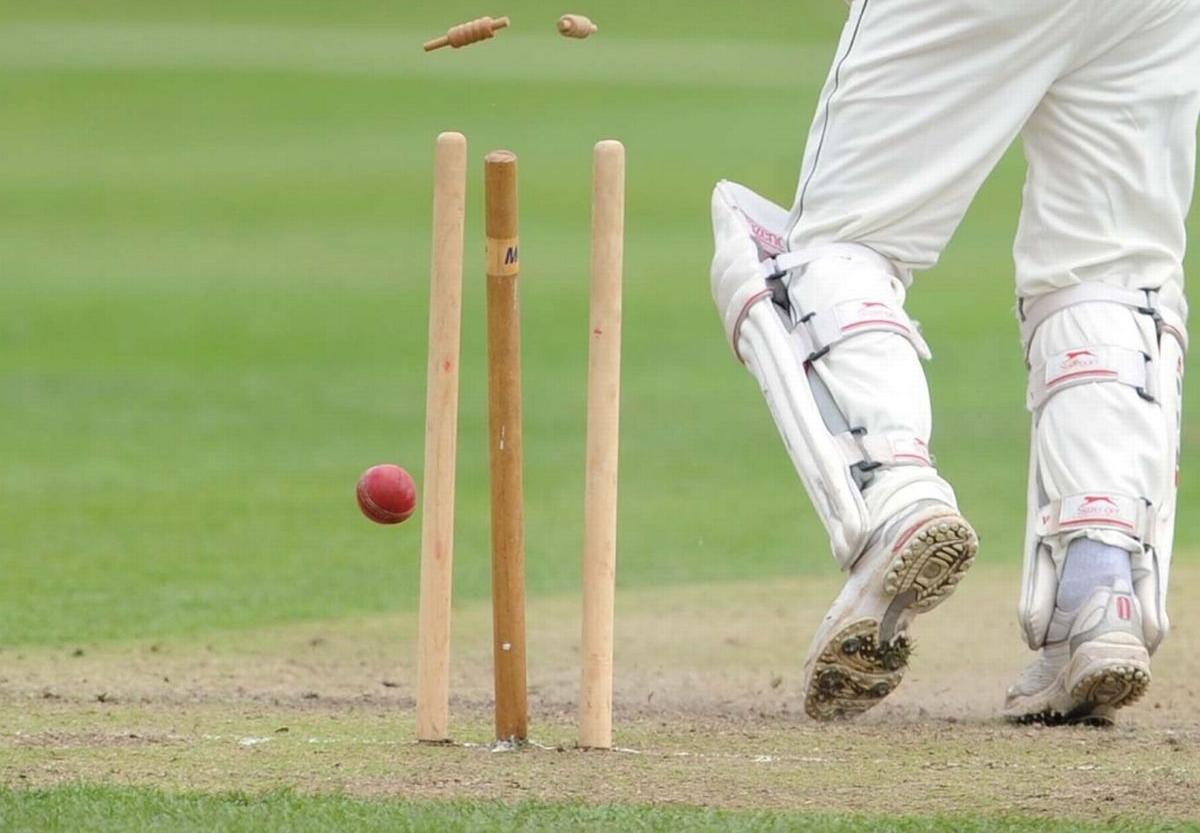
How is acting like cricket?
Why taking your mark on set is like walking out to bat
Words: Henry Lloyd-Hughes
There is a paradox at the heart of cricket. This complex sport is the ultimate team game. And yet it is also a deeply solo venture. In order for the game to function you need a bowler, a wicket keeper, two umpires, a scorer, nine fielders spread in any number of positions, two sets of stumps, two batsmen equipped with pads, and a ball made of specific leather with a specific seam pattern woven into the side of it. And yet, the truth is that all of this collective effort fades into the background as the real battle begins: the battle of the mind.
In few sports is your day’s play brought to such a crushing conclusion with a moment’s lapse in concentration. As a batsman losing your wicket, the slow surrender from the field is soundtracked by the voices in your head telling you how you should’ve played it differently. Over and over: “that wasn’t the one to hit,” or “you should’ve seen that bowler off and waited for the spinner”.
And now to my own precarious profession. I am not, dear reader, a cricketer. Do I play? Yes — 51 not out, aged nine, remains my top score. As a club cricketer in adulthood I’m capable of a breathless 10 or 20 runs followed by two fraught overs of slow left arm rubbish. Occasionally I am gifted a wicket. More than playing, though, I study the game, consuming it in vast quantities. I pore over the details, the macro and the micro, the clothes, the history, the slow ache of change.

And the more I know, the less I understand. I have precisely the wrong brain-type for this obsession, like a man with no hands fixated upon playing the piano. My ability to grasp figures is woeful. I still do a double or triple take every time I see a scorecard. Fielding positions that should sound familiar leave me perplexed, even if I’ve fielded there before, maybe in the last game, maybe for a whole season. “It’s like gully, but a bit more on the 45,” someone would kindly proffer, only for me to nod, now even more confused than before.
It is genuinely astonishing that someone who has watched every format of the men’s and women’s game, played on tour, read CLR James’ complete works (not to mention Phil Tufnell’s autobiography, of which the less said the better) could still end up without a concrete grasp of how it truly works.
So for me cricket provides another function. It is a sublime parable through which I view my own life. Making TV and film, as I do for my (day) job, I too operate as part of a huge multifaceted team. Walking on to a film set I feel a huge sense of joy at the number of bodies all pushing towards the same goal. The first person I see is the unit driver outside my door at 5am in the gloom of lamplight. When I arrive in some often remote place, the location department will have set up a small trailer split into three compartments.
The caterers will have been working on breakfast since 4am. The costume department furnishes me with the right clothes for this morning’s scene, the assistant directors ensure everything runs to schedule, and the art department and sparks will have been hoisting and erecting beautiful lighting and decorations to make even the most humble space feel like a cathedral. And now we’re zeroing in on my space. Nestled in beside the grips and focus-pullers of the camera department, next to the sound man with the boom mic, there is a six inch strip of orange tape on the floor. This is my mark, and after speaking to the director about the complexities of what we’re hoping to achieve in this scene, everything falls silent and hundreds of eyes turn to me and this six inch strip of tape on the floor. Here my feet must stand, and the angle of my eyes must be perfect to the centimetre to catch the light just so, to convey the precise emotion through words the writer might’ve agonised over for ten years.

It is in these moments, standing on my mark, that I imagine I am Jimmy Anderson, standing on his mark, blocking out all distractions, on the morning of a test match. Perhaps I’m coming back from injury, wanting to show the hushed crowd in the packed stadium that my body still works; that when there’s a bit of green on the pitch and the ball is new I can still swing it in, and then out, and then back again. I tell myself, when the mountain of pressure seems insurmountable, that I am Jimmy Anderson and those 500 test wickets can’t be wrong.
If I don’t force it, don’t go looking for wickets, trust my technique then the ball will swing. “Cut” they shout, “Let’s go for one more”, so I feel the ball in my hand, return to my mark, and pray the next one comes out right. The life on set as England’s greatest ever bowler is a world away from the guerrilla warfare of the audition process, which is where actors spend most of their time. An actor is lucky if half his year or more is spent actually doing his job. The rest is spent meeting casting directors and producers and auditioning for roles he will most likely never get. It is here that I am padded up with a bat in my hand. I am fully versed in the agony of Jonathan Trott’s headspace in 2015, right before he decided to step back from international cricket.
I know what it feels like to walk into a room and feel only indifference or hostility from those facing you. The voices in your head remind you of all the failures that lead you to this point. The fluffed lines. The flaws in your technique that everyone is talking about. This casting director hates me, this director’s notes are terrible. Try to remember the basics. See the ball, don’t forget to watch the ball. As you smile and shake the hands of people you will never work with, just try to watch the ball. Keep it simple, eyes level, head to the ball. Don’t forget to move your feet.
Every audition scene is facing a new bowler you’ve never seen before. Just try and react, play each ball on its merits, trust your instincts, don’t go too big, don’t go too small, don’t forget to listen, don’t forget to blink. For God’s sake just be good. Don’t let the producer scrolling through emails on his phone put you off. Don’t let the four people sat outside the door who look exactly like you put you off. You see how the odds are stacked against you.

Sometimes it seems all everyone is waiting for is the moment when you fuck up. The slurred syllable, the accent slip — and then you hear the death rattle and look behind you to see the stumps on the ground. So you try to play your best game, try to play out of your skin — even when your head is full of doubt and it feels all you can see and hear is failure.
I have been all batsmen but particularly the loneliest ones, the ones scratching for form, whose lustre seems to be dwindling. The ones who march out to defy the critics, to prove to themselves they can still do it, when the statistics speak otherwise.
As I write this now in a hotel room, I’m scribbling on the back of old audition scenes. I can’t even remember how long these pages have been in my suitcase, or who got the part, or whether the show was any good. Ninety percent of jobs I go up for I don’t get, and I’m one of the lucky ones. Failure is my constant companion, my professional brain is made of scar tissue left by the commissioner who didn’t think I had any charisma, the producers who didn’t think I was bankable, and the writer who vetoed me because he fancied the other actor. And yet, saluting the bravery of Mr. Trott et al, on I march to take my position at the crease to face another over from an unknown fast bowler. “Middle please umpire.”
Want more from Henry Lloyd-Hughes? Read our interview with the actor here…
Join the Gentleman’s Journal Clubhouse here.
